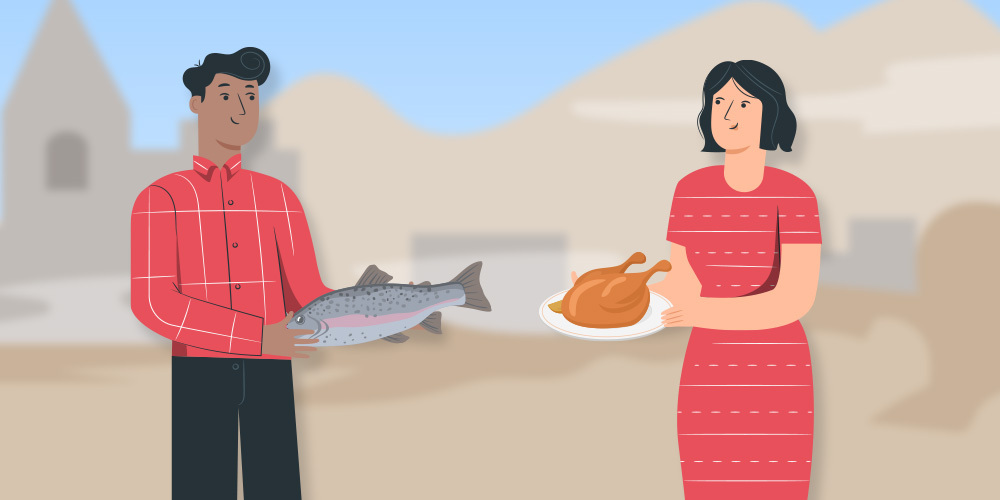A barter system is the oldest form of commerce. Earlier, all the trade practices were carried out according to the barter system of exchange. People used to exchange goods with each other to satisfy their wants. A barter system refers to the exchange of goods & services with two or more parties without the use of money. In other words, the exchange of one good or service from a party in return for a good or service by another party. This exchange is also known as “C-C Transactions“( c stands for commodity).
For example– A farmer gives oil to a weaver in exchange for cloth. Here, both the weaver and farmer exchange goods with each other without involving money or any monetary medium.

The barter system can work when there is an existence of ‘Double Coincidence of Wants’.
Double Coincidence of Wants
A double coincidence of wants is a situation where both parties hold an item needed by the other to fulfill their demand. So, they exchange items without any monetary medium, which leads to barter trade.
Double coincidence of wants means that both parties agree to buy and sell each other’s items. A barter exchange is not possible if there is no double coincidence of wants. Such a situation is very rare to find.
For example, if a person has wheat and he wants to exchange it for rice, and another person has wheat and wants to exchange it for rice, then they can exchange their goods with the agreement of both parties. This particular type of exchange is termed a double coincidence of wants.
However, in real life, it’s very difficult to find a double coincidence of wants situation, as it involves huge “trading costs“.
Trading cost is the cost that occurs during the trading process. Trading cost is of two types:-
1. Search Cost:- It refers to the physical cost incurred by a person in search of another person with whom he will enter into a barter deal. For example, a farmer is in search of a person who needs wheat in exchange for cloth. The efforts required to search for the person and the time involved constitutes the search cost. Search cost can either be an opportunity cost for time spent in search or the cost of quality deterioration of goods during the search period.
2. Disutility of Waiting:- It refers to the discomfort in waiting for the double coincidence of wants to happen, i.e., waiting for the person who is willing to sell what you want, and willing to buy what you sell.
Limitations of Barter System
With the rise in economic activities, it became difficult and complex to exchange goods for goods. So, the barter system has various limitations which are as follows:
1. Lack of Double Coincidence of Wants:
A barter system is possible only when there is a situation of “double coincidence of wants“. i.e., when both parties are ready to exchange each other’s goods. For example, A can exchange goods with B only if A has the goods needed by B, and B has the goods needed by A. Such a double coincidence of wants is rare.
2. Lack of Common Measure of Value:
In a barter system, all the commodities do not possess equal value, moreover, there is no common measure of value in which exchange ratios can be fixed. For example, if A has wheat and B has rice, then it’s difficult to decide, in exchange for 1 kg of wheat how much rice is needed. In absence of a common measure of value, the exchange ratio is fixed randomly, hence, one party mostly suffers.
3. Lack of Standard of Deferred Payment:
In a barter system, deals consist of future payments and credits can not be carried out easily, as the borrower may not be able to provide the same quality goods as promised at the time of repayment, and the value of the commodity to be exchanged can be increased or decreased at the time of repayment. There also may be conflicts regarding the type of commodity used for the repayment.
4. Lack of Store of Value:
In a barter system, it is very difficult to store the wealth for future use, as the storage of goods requires time and efforts, and the commodities used for exchange are wheat, rice, vegetables, etc., are non-durable goods, i.e., their quality falls with the passage of time.
5. Lack of Divisibility:
The barter exchange between divisible and indivisible goods in a small value is not possible without the loss of a value. For example, if the price of a sheep is 40kg of rice, then the person with 20kg of rice can not exchange it for sheep, as it is not possible to cut the sheep into small pieces without destroying its utility.
With so many difficulties, it was not possible to continue barter system for a very long period of time. As a result, it was replaced by Monetary Exchange.
Leave a Reply